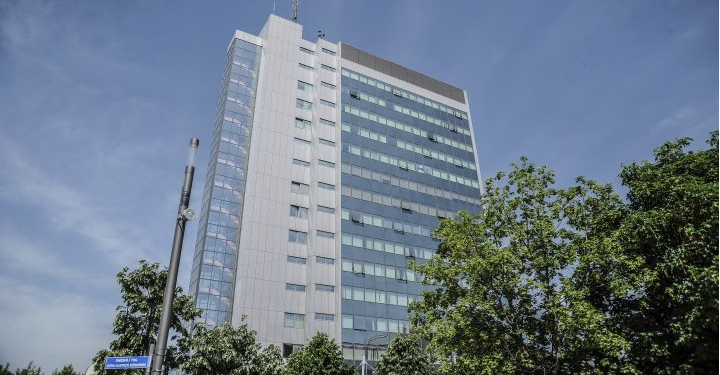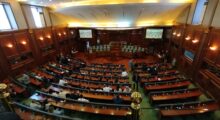Kosovo judiciary announce strikes, demanding that Albin Kurti's government revokes a draft law on salaries in the public sector which they fear could lead to paying cuts.
Months after facing teachers’ protests over pay, the Kosovo government is on the brink of dealing with another public sector strike, by staff in the justice system.
Judicial officials have announced strikes if the government does not revoke a draft law on public sector salaries, saying they will not accept any cuts in salaries.
Minister of Justice Albulena Haxhiu, however, told a press conference on Thursday that if public sector pay is legally levelled, salaries in the judiciary will in fact increase.
“The purpose is to reform the public administration and not have differences in salaries; the law levels the salaries of the judges and prosecutors,” Haxhiu told the media, explaining that Wednesday’s government decision repeals a decision by former PM Ramush Haradinaj. “Former PM Haradinaj had increased his salary and had not thought of the issues in the future,” Haxhiu said.
Haxhiu claimed that under the new draft salary law, the salaries of judges and prosecutors will rise.
On Wednesday, the government approved the draft law, which now has to be voted on in parliament, revoking a decision by former PM Haradinaj that increased salaries in the justice system. Prime Minister Albin Kurti said a unified system of public sector salaries is needed. “Today’s proposal attaches great importance to qualifications. No one may be paid more than five times the lowest salary in our administration,” he said.
Meanwhile, the Judicial Council of Kosovo, KGJK, said it would only deal with essential services, as a result of which the trial of one of the biggest corruption cases in the country, codenamed Stenta, was stopped on Thursday at the Pristina Basic Court.
There have been more than 62 accused in the case, including senior public officials and health workers, who are accused of abuse of official positions, receiving and giving bribes, unconscionable medical treatment, the illegal exercise of medical activity and tax evasion. According to the indictment, the defendants issued referral letters for treatment outside public health institutions to at least 233 people.
The KGJK on Thursday named eight essential services still to be offered. They include proceedings and hearings related to measures for the safety of defendants in proceedings, hearings on custody cases and cases related to defendants with mental disorders, handling requests for sequestration and temporary measures, execution of criminal decisions, cases of domestic violence, cases in any procedure where the interest of a child is in question, procedures for sending persons to rehabilitation as well as all administrative services.
The Prosecutorial Council, KPK, on Wednesday said they will also strike and will radicalize their demands if the government does not annul its decision by December 8.
“Members of the KPK and the chief prosecutors … unanimously assessed that today’s decision of the Government … is an unconstitutional and illegal decision, as well as flagrant interference in the independence of the prosecutorial system,” the KPK said.
“Meanwhile, the work of the prosecutors will be reduced and will continue only with essential services. Also, the Council and prosecutions will suspend all forms of collaboration with representatives [of the government,” it continued.
The draft of the Law on Public Sector Salaries was first circulated in the local media in February. in it, the coefficients of salaries were set from 1 to 20, but without specifying the actual value of the coefficient for the first year of implementation of the law. The draft law said the coefficient would be determined in the budget law in subsequent years.
At that time, dissatisfaction was expressed by different categories of public officials regarding the coefficients. Since then, no other draft or proposal has been presented by the government.
The Union of Independent Trade Unions of Kosovo declared a general strike in the public sector on August 25, demanding a 100-euros salary increase for all employees until the approval and implementation of the Law on Salaries.
On June 30, the Constitutional Court ruled the Law on Salaries in the Public Sector invalid, arguing that the law was not in compliance with 11 articles of the Constitution.
Six Kosovo civil society organizations also condemned the government’s decision, claiming it violates constitutional norms and increases the chances of interference in the justice system.
The organizations on Thursday said the Venice Commission, answering the Kosovo Constitutional Court’s questions about the Law on Salaries in 2020, had said that judicial salaries may not be reduced in normal circumstances.
They cited the Venice Commission as writing: ‘The reduction of judicial salaries can only happen under conditions of a pronounced economic and financial crisis and which, moreover, must be officially recognized as such’ and added: “Judicial independence requires a basic degree of financial security from arbitrary interventions by the executive or other branches of power.”
“For these reasons, the decision of the Government … to reduce the salaries of judges and prosecutors clearly represents interference in the independence of the judiciary and is contrary to the standards established by the Venice Commission,” the organizations said.
They also argued that, while in opposition, Kurti’s ruling Vetevendosje party “itself in its request to the Constitutional Court emphasized that ‘…reducing and increasing them [salaries] is the [sole] competence of the Assembly of the Republic of Kosovo’.”
























